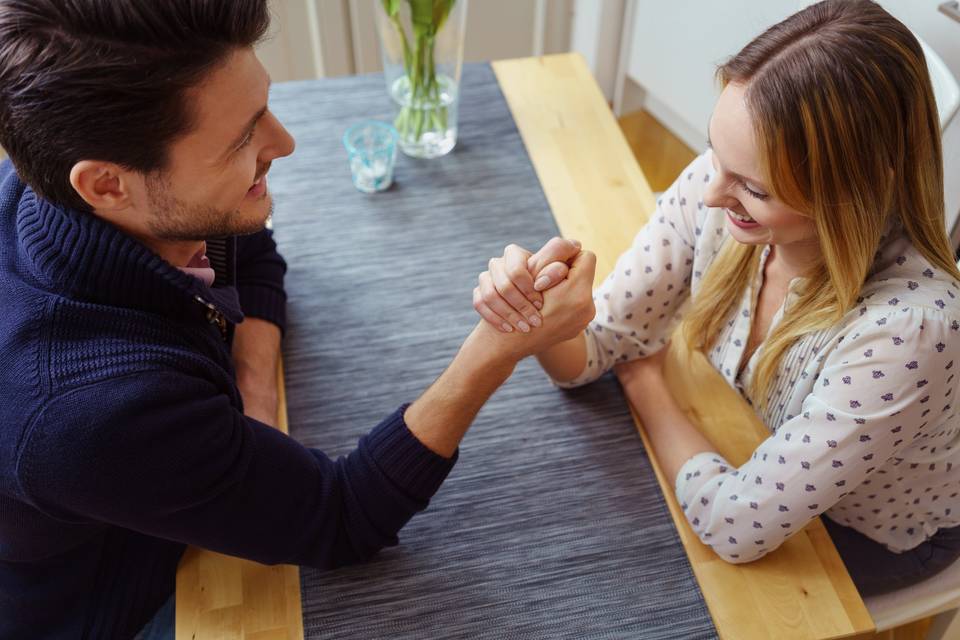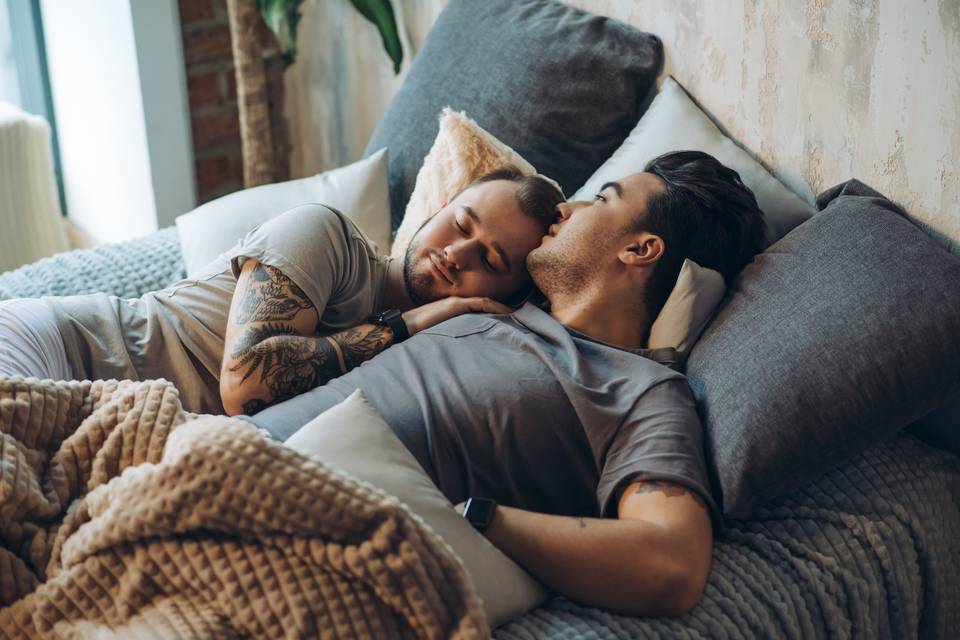Is There an Ideal Age Gap in a Relationship?
Should one partner be older than the other? If so, by how much? We’ve got all the expert answers and advice on the best relationship age gap.


Age gaps in relationships are nothing new. In fact, if you look closely at your family tree, you may notice that your grandparents or great-great grandparents were several years, if not a full decade apart. Historically speaking, in straight relationships (as that's where the majority of data exists due to the unfortunate lack of research into other couples) it’s been most common for the woman to be younger than the man.
“Part of this was because men often worked for their fathers and lived with them or received room and board from their employers that weren't fit for a married couple or family,” explains Lee Wilson, relationship coach and online educator for TED on the science of relationships. “As men grew older, they had credibility and knowledge enough to start their own business and then could afford their own home and could take care of a wife since women typically didn't work or earn income.”
Relationship Age Gaps in Modern Society
In today’s day and age, what is perceived as socially acceptable in terms of age gaps has significantly widened. “Most of these perceptions are archaic and outdated,” notes David Klow, Chicago-based Licensed Marriage and Family Therapist in Chicago, owner of Skylight Counseling Center and author of You Are Not Crazy: Letters From Your Therapist. “In today's evolving world, we are becoming more aware that relationships come in all shapes and sizes.”
Bonnie Winston, celebrity matchmaker and relationship expert, agrees, adding that if someone is older in any relationship (gay, straight, etc.), they usually have more life experience and can teach or mentor the other person. “When someone is younger they can add value by looking at things in a fresh, new way and bring a burst of new life to a relationship,” she says. “These days, age gaps don’t really cause waves, they are more accepted as society has loosened up rigid standards.”
And, as it turns out, age-gap relationships can be healthy for relationships, according to experts. As Nicole Moore, triple-certified life coach and relationship expert, points out, one of the most beautiful and healthy things about age-gap relationships is that couples often attribute their success to having a bond that goes far beyond face value. However, she points out that age-gap relationships can also be unhealthy if there are power dynamics in play that do not support one or both partners. “Ideally in an age-gap relationship, both partners see the other person as an equal with just as much to contribute to the relationship; however, in some age gap relationships, especially in those where the older partner is wealthier or more established in their career, there can be an unhealthy power dynamic at play where the older partner controls more of the decisions or has more of a say in the relationship,” she explains. “Another potential issue with age-gap relationships is that in some cases, a partner may fetishize someone older or younger and the attraction is coming more from an unhealed place than real love.”
Klow agrees that age-gap relationships can go one of two ways. He has worked with couples who were the same age chronologically, but lived very different lifestyles that made it more difficult for them to relate, and he’s also worked with couples with a large age gap who shared a greater sense of a shared vision for their lives.
What does the ideal relationship age gap look like?
According to Lee, heterosexual relationships with an age gap still seem to work out best when the man is the one who is older. While an age-gap relationship where the woman is older can most certainly work out well, he finds that there are more advantages when it is the man who is the older one. “This is likely due to the old saying that women mature faster than men and so a young woman possibly feels like she is surrounded by boys but sees a man who is 10 or 20 years older and appreciates his maturity,” he says. “If she doesn't feel she can respect men her age, that is a major issue to being in a relationship with one of them and it would make more sense for her to be with someone with more maturity that comes from age and experience.”
In Lee’s experience, relationships where one partner (most often the man in heterosexual relationships) is 10-15 years older actually have the most success. But our other experts argue that there was no "ideal" age gap.
"Everybody is at different levels of maturation, so the most important factor is always going to be knowing who you are and where you are in your developmental cycle," Dr. Jacqueline Del Rosario, relationship expert and certified premarital course provider says. "Always keep in mind that compatibility and congruence, even with age gaps, will be the secret to making your relationship work for you."
Here’s how to succeed in an age-gap relationship.
If you are significantly older or younger than your partner, here are some expert tips for how to stay on the same page.
Map out mutual relationship goals.
Whether you and your partner are close or far apart in age, making sure you share the same relationship goals is key. Spicy Mari, matchmaker and relationship expert, recommends creating a relationship vision board with your 3-month expectations, 1-year expectations, 3-year expectations and lifetime expectations for the relationship. Then start tackling the goals together. “Be sure to list out your heart's desires and hold one another accountable to conquering them as a team,” she says.
Embrace your differences.
Your age gap will very likely bring about some very specific differences in how you live your lives—and that’s OK. Should this be the case, Lee warns against the younger partner trying to act older or be in the same situation in life as their older partner. “The other person fell in love with you and wanted to be with you for who you are,” he says. “That doesn't mean that you don't learn from the strengths of the other person, but you don't marry someone to become their clone.” He recommends staying true to who you are and being equally open to your partner doing the same.
Share in each other's interests.
Lee recommends finding shared activities and hobbies that you enjoy doing together. “One of the best ways to do this is to print out a list of hobbies like the one here and have a copy for each partner,” he says. Go through your lists and circle the hobbies that interest you and then put your lists together to find where you match.” Consider picking one date on the calendar each month—or perhaps twice a month—to participate in one of those activities, alternating between yours and theirs.
Allow each of you to take the lead.
Moore warns not to fall into the trap of always defaulting to what the older person wants to do. “One of the challenges with age-gap relationships is that the younger partner may feel like they have to go along with what the older partner wants because of an idea that those who are older always know better,” she says. “If an age gap couple contains a partner who is significantly older and has achieved a certain level of career or financial success while the younger hasn’t yet, there can often be an unspoken assumption that the younger partner must mold themselves into the established partner’s pre-existing life.”
Maintain healthy boundaries with friends and family.
If the age gap is more than 10 years, or one partner is still in their late teens or early 20s, social judgment may be something you will have to contend with, notes Terri Cole, author of Boundary Boss and licensed psychotherapist. This is where healthy boundaries come in clutch. “It’s your life and who you love is your choice,” she says. “You are not required to allow all the people to give you their unasked-for advice or criticism about your relationship.” She recommends creating boundaries between those who are unsupportive so that it does not become destructive to your relationship.





